8+ Sample Trailer Bill of Sales
-
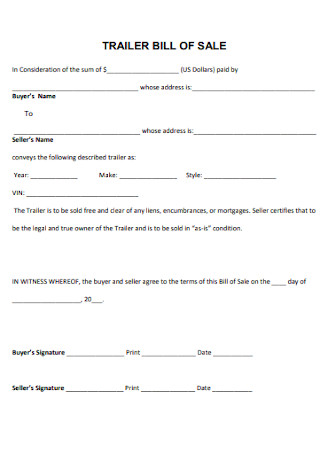
Sample Trailor Bill of Sale
download now -
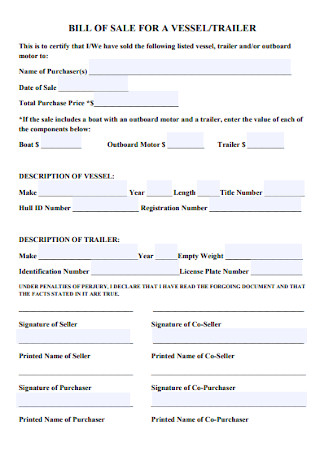
Tailer Bill of Sale for a Vessel
download now -
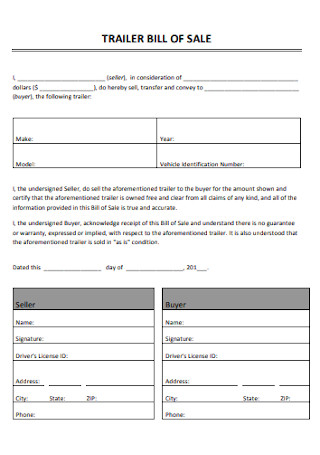
Simple Trailer Bill of Sale
download now -
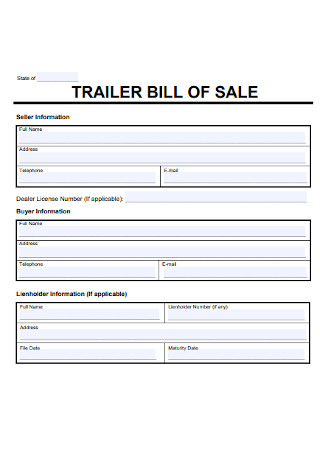
Basic Trailer Bill of Sale
download now -
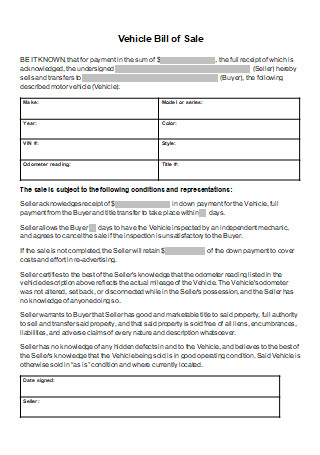
Vehicle Trailer Bill of Sale
download now -
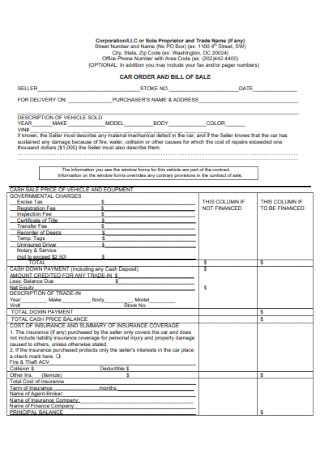
Car Trailer Bill of Sale
download now -
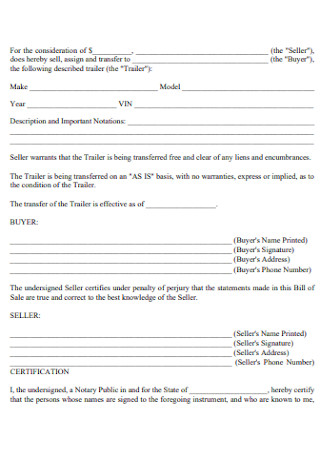
Tennessee Trailer Bill of Sale
download now -
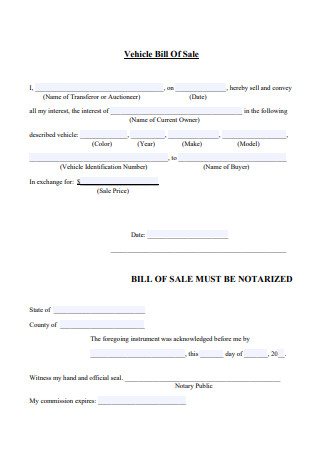
Private Vehicle Trailer Bill of Sale
download now
FREE Trailer Bill of Sale s to Download
8+ Sample Trailer Bill of Sales
What Is a Trailer Bill of Sale?
Do I Need a Bill of Sale for My Trailer?
How to Sell a Trailer?
Elements of a Trailer Bill of Sale
How to Create a Trailer Bill of Sale?
FAQs
Do I Need to Notarize My Trailer Bill of Sale?
How Do I Notarize the Trailer Bill of Sale?
Does a Seller Have the Right to Back Out of the Bill of Sale?
Do Both Parties Have to Present in Front of the Notary Public?
Selling a trailer is similar to selling other major items such as furniture. In contrast to purchasing a vehicle, there is no test drive required, which makes the selling process simpler. Make sure to include your price, terms of sale, and other key information in your ad, then go over those details with the buyer again after you have received an offer. Before you sell your house, go over the bill of sale with your buyer, and be sure to provide them with a copy of it.
What Is a Trailer Bill of Sale?
It is possible to sell and transfer ownership of a trailer using a trailer bill of sale, which can be found in the legal documents section of your local library. This bill of sale contains a detailed description of the trailer, as well as the names and contact information for the buyer and seller, as well as acknowledgment receipts (applies to some states only). Its primary function is to provide documentation for the aforementioned transaction as well as for registration purposes (in some states that require a bill of sale).
When a trailer bill of sale form is completed, it produces a legible paper transcript that depicts the specifics of the sale of a non-powered utility transport that will be utilized in towing or towing another vehicle. This form contains information on the purchaser and seller, as well as information about the trailer, the date of sale, and a signature for the purpose of authenticating the purchase. It can also be used as proof of ownership for purposes including registration, titling, and tax compliance. Other templates are available on our website, and you can use them whenever you need them. They are as follows: bill of sale camper, bill of sale camper for boat, trailer bill of sale in Texas, generic bill of sale, Ohio trailer bill of sale, trailer bill of sale from Florida, vessel bill of sale, used car purchase agreement, Kansas Trailer bill of sale, car sale agreement, Colorado bill of sale, auto bill of sale, and other similar template are available. This post will not only provide you with templates but will also provide you with important information that you need to know in order to complete your template.
Do I Need a Bill of Sale for My Trailer?
It is a wise business choice to take the appropriate measures to get a bill of sale when transferring ownership to a new owner, even if such documentation is not required in your state of residence. Many states in the United States, however, do require a bill of sale in order to legally document the transfer of ownership of the car and the corresponding data involved. Some states may require it to be noted on the bill of sale for another vehicle that contains a trailer if the car is sold with a trailer. For example, if the purchase of watercraft includes the purchase of a boat trailer, the trailer information must be recorded as well in order for the watercraft to be properly titled and registered. It is just a clever technique to ensure transparency throughout the sale, document the associated details, and provide evidence of a genuine exchange in the event that the transaction is ever called into question.
How to Sell a Trailer?
Acquiring a trailer is actually a quite basic process. Take a look at our brief step-by-step guide below for more information. Selling a trailer is similar to selling other major items such as furniture. In contrast to purchasing a vehicle, there is no test drive required, which makes the selling process simpler. Make sure to include your price, terms of sale, and other key information in your ad, then go over those details with the buyer again after you have received an offer. Before you sell your house, go over the bill of sale with your buyer, and be sure to provide them with a copy of it.
1. Identify and resolve any significant issues.
While selling an item, the larger the yield will be, the better the condition it looks to be in when it is being sold. Wash your trailer thoroughly, paying particular attention to problem areas that may accumulate dirt, mud, or dust readily. Make a visual inspection of your trailer for any damage that may need to be repaired, since apparent flaws might lead a customer to believe that they can get a better product elsewhere, or they can fuel discussions for a lower price. To ensure that the vehicle is in safe running condition, look for any areas where rust has developed, check the tire air pressure, coupling brakes, and lights, and make any necessary modifications as needed.
2. Determine an Appropriate Selling Price
When it comes time to choose the price at which you will sell your home, you should conduct thorough research. On NadaGuides.com, you may inquire about the used book value to get a general sense of how much it is worth. Additionally, research what similar year, make, and model vehicles are selling for in your area and on the internet is recommended. The ability to obtain pricing information for at least three comparable trailers for sale can also provide you an advantage in the event that a potential buyer decides to call into question your pricing judgment.
3. Make the trailer widely known.
Ensure that you include all of the necessary information in your ad description, including the trailer type, year, make, model, size, load capacity (if applicable), and style when advertising the trailer. Photos are an important aspect of promoting your trailer; make sure to photograph it from a variety of angles and include close-ups of any moving parts or places that have corrosion or damage to ensure maximum exposure. If there are any damaged areas, you will want to make that clear in your ad or determine whether you want to market the item as “as is.” Provide any contact information you would like to make available to anyone who may be interested in purchasing your property, such as a phone number and an email address. You can promote the sale through a variety of channels in order to reach as many potential purchasers as possible. Place the trailer in front of your house with a sign that says “for sale” to tempt passersby to make a purchase. Create a classified ad and place it in your local newspaper or community flyer. If you want to reach a larger audience online, post it on Craigslist or eBay. Alternatively, for websites that are specifically aimed toward selling trailers, you can look to TrailerTraders or Trailer Shopper, where you can put an online classified, or Trailers for Less, where you can hire someone else to arrange the sale on your behalf, for example.
4. Manage the trailer’s sale from start to finish.
When you have identified a potential buyer for the trailer, you will want to arrange a meeting in a public place so that they can inspect the vehicle and discuss the terms of the sale with you. Following the agreement on a suitable purchase price by both the buyer and the seller, you will need to meet again to sign the bill of sale and exchange the cash in exchange for the automobile. The best place to conduct the transaction would be in a local bank, where the money could be verified as genuine tender before the trailer was handed over to the customer. Complete the sale by handing over the title, registration, keys, and any other materials linked with the car to the buyer.
5. Obtaining a Trailer Registration
To be able to use your trailer on public highways, it must first be registered with the state in which you reside. However, many states demand that you finish the procedure within the first 30 days of making the purchase, so check with your state’s legislation for specific instructions. The bill of sale, a signed over the title, a completed and signed trailer registration application, acceptable identity, and payment of all applicable fees and taxes are all required in order to execute the transaction successfully. Additionally, you may be needed to produce proof of current trailer liability insurance as well as proof of past registration. For more specific information, check with your local DMV or state transportation office first.
Elements of a Trailer Bill of Sale
There are several essential items to add to a trailer bill of sale that you should know about. When writing your bill of sale, follow these guidelines to ensure that it is legally enforceable and understandable to both the buyer and the seller.
How to Create a Trailer Bill of Sale?
All sorts of trailers are built to serve a variety of functions. In the United States, trucks account for more than 80 percent of all inland freight, according to Home Stratosphere These trucks make use of trailers in order to transport loads of equipment or vehicles from one location to the next. Trailers are not one-size-fits-all devices; they are designed to resist the weight and nature of the material or items that they are intended to transport, rather than the other way around. A list of useful tips to assist you in the creation of a trailer bill of sale has been provided for your convenience. Take a look at these suggestions:
1. Obtain information from both parties involved.
Collect the names and mailing addresses of the persons who are participating in order to get to know them better. In order to guarantee that you are dealing with the correct individual, you should request a government-issued identification card. Your own mistakes will be less frequent as well as others’.
2. Determine the purchase price in step two.
Your buying price must be reasonable in comparison to the value of the trailer that you are selling. You must also take into consideration the number of years that you have used the trailer, which is likely to be less than the trailer’s original purchase price. When determining the purchasing price of the trailer, be reasonable.
3. Provide a thorough description of the trailer in your document.
Trailers come in a variety of shapes and sizes to best fulfill their purposes. Flatbed trailers, refrigerated trailers, specialty trailers, side-kit trailers, and many other types of trailers are among the options available. It is important to specify in the bill of sale what sort of trailer you are selling. Don’t forget to include information on the trailer’s distinctive characteristics, such as its manufacturer, model, year of manufacture, VIN, and any other pertinent information.
4. Sign and seal the agreement to complete it.
Without the signatures of both parties on legal documents, such as your trailer bill of sale, the document is null and void. Sign and date the form at the bottom of the page, followed by your names and signatures. With your signatures on the bill of sale, you are indicating that you have both agreed to the terms and conditions set forth in the document. Legal documents also require witnesses to sign the document in order to demonstrate that the signatures were not falsified in any way. According to Law Depot, the witness cannot be younger than 18 years of age and must be of sound mind in order to personally observe the signing of the bill of sale in person. Furthermore, they must authenticate the identity of both parties and then sign the document to certify that they did, in fact, witness the signing of the document
5. If the state requires it, provide a Certificate of Acknowledgment with your submission.
Not all states require that a bill of sale be acknowledged by a notary public before it can be executed. Several states, including Louisiana, Maryland, Nebraska, New Hampshire, and West Virginia, need the signature of a notary public before a document can be legally signed. This certificate of acknowledgment contains the notary public’s name, signature, seal, and the date on which his or her commission is set to expire.
Trailers traveling the concrete roadways, moving goods, materials, or heavy equipment from one area to another, are something we’ve seen quite a few times. They make it easier for personnel on both sides of the agreement to do their jobs. When you decide to sell your trailer to a prospective buyer, the trailer should provide you with a sense of security and protection, regardless of whether you are the buyer or the seller of the trailer. When deciding to purchase or sell an object, both time and money are committed; as a result, this trailer bill of sale will be the appropriate instrument in ensuring that your assets are in the proper hands.
FAQs
Do I Need to Notarize My Trailer Bill of Sale?
While it is not required, it is strongly encouraged because it serves to confirm both parties’ identities and the fact that both parties signed the form with their consent. The notary public guarantees that the document is accurately signed by both parties by verifying their signatures.
How Do I Notarize the Trailer Bill of Sale?
The first step is to obtain a trailer bill of sale form and locate the nearest notary public, who will witness the signing of the document. The second step is to purchase the trailer. Following that, you will be required to pay the appropriate notary fee.
Does a Seller Have the Right to Back Out of the Bill of Sale?
Although it is uncommon for a seller to back out of a transaction, it is conceivable. In accordance with Apartment Therapy, the buyer has the full authority to proceed with the transaction or to force it as long as there are no current exit conditions for the seller.
Do Both Parties Have to Present in Front of the Notary Public?
The answer is no, provided that they each sign the document in front of a notary public individually, everything should be alright. In order to expedite the trailer sale process, you may simply sign the document with the other party in front of a notary public to expedite the transaction.
Your bill of sale serves as a reference document in the event that there are any concerns or disagreements in the future. It is critical that the paper be signed and dated by both parties involved. Make sure you have two copies of the document so that both the buyer and the seller have the same document. When selling a trailer, you can write a bill of sale by hand, but it’s usually faster to print off a basic form to fill out and use instead. There is a plethora of bill of sale templates available online that can assist you in creating one that is tailored to your individual needs. When selling a significant object, it is critical to have a bill of sale in place. However, it is especially important when selling a product that will be transported by truck, such as a trailer. Make sure to include the names, signatures, and contact information of both the buyer and the seller. The particular terms of the sale should also be included, as should be obvious. By ensuring that both parties have an identical bill of sale document, you can significantly reduce the likelihood of a problem arising in the event of a legal dispute in the future.
